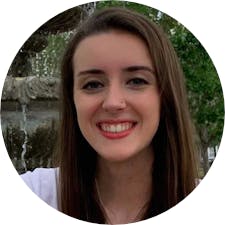When Amy Williams watched meteor showers with her parents as a kid, she knew it was only a matter of time before she would begin exploring the depths of space herself.
Now, Williams’ galactic aspirations are directly contributing to one of the most ambitious missions to Mars.
The 35-year-old UF geological sciences assistant professor is participating in her second mission to analyze for signs of ancient life on Mars through NASA’s Perseverance rover team, which is landing on the red planet Thursday. The rover initially launched from Earth on July 30, and, according to its website, will land around 3:55 p.m. NASA will broadcast the live landing at 2:15 p.m.
“I've got a lot of nervous energy,” she said. “I'm very excited about the opportunity to search for life in the universe.”
The proposal she wrote to join the mission was one of the 13 selected out of over 100 submissions, Williams said. When decisions were released in the fall, she initially refused to check to see if hers had been accepted for fear of rejection, despite previously serving on NASA’s Curiosity rover team.
Two women pursuing their Ph.D.s in Williams’ lab group have also joined the mission. One of them is Lydia Kivrak, a 23-year-old UF astrobiology doctoral student, who believes Williams’ proposal was accepted because of her experience in detecting organic molecules, which is one of the rover’s objectives through the use of a raman spectrometer, a tool that detects molecule vibrations.
“The neat thing about Perseverance is that it has an instrument that has never before been sent to Mars,” she said.
In a UF press release posted Feb. 8, Denise Buckner, the other doctoral student in Williams’ lab group who joined the mission, said working on the Perseverance team is the coolest thing she has ever done.
“Conducting research on another planet and exploring places no one has ever explored before is the most exciting work I can possibly imagine,” she said.
Williams said she and her colleagues around the world will be following a Martian day schedule of 24 hours and 37 minutes long for the first three months of the rover’s mission. Each workday will begin 40 minutes later than the previous day.
“Your schedule shifts around the clock, so 9 a.m. one day, 9:40 the next day, 10:20 the next day,” she said. “Not seeing the sun until you’re kind of ready to go to bed; it’s very challenging.”
The Perseverance rover is engineered to search more extensively for data that can indicate signs of ancient life than the Curiosity rover, including retrieving samples to potentially send back to Earth. Williams said taking the mission to this next step is a dream come true.
“It is the first step in, I would say, one of the grandest planetary architectures that we’ve taken on since sending humans to the moon,” she said. “Mars sample return is going to be the biggest next step in our understanding not only of Mars but it’s going to give us a lot of insight into planetary evolution in general.”
Chance Sturrup, one of Williams’ undergraduate students working on projects with applications to Mars research, said he is fascinated by the sheer amount of new information and opportunities for experiments that the mission holds.
“We’re not going to find little green men on Mars,” the 21-year-old UF geology senior said. “But we might find little green specs and bacteria, and that would be amazing. Even just the remnants of possible preserved bacteria would be incredible.”
Sturrup said he and his lab group are planning for a remote watch party to witness the landing on Thursday morning. The slight nerves Sturrup is experiencing about something going awry are overwhelmed by his eagerness for the landing and the consequent discoveries, he said.
“Knock on wood, right? Something could go wrong, but the people are incredibly skilled and talented, and I'm sure everything's gonna go fantastically well,” he said. “It's just incredible to be able to see it first hand.”
Williams’ said she is motivated by her ability to provide useful tools and positive experiences for her students, in whom she wants to instill excitement and foster success for their future careers.
“You got to have a good reason to get up every morning, and it makes you want to participate in and give 100%,” she said. “One hundred and ten percent, if you're on Mars time.”
Contact Abigail Hasebroock at ahasebroock@alligator.org. Follow her on Twitter @abbeyhasebroock.

Abigail is a second-year journalism major covering university general assignment news for The Alligator. When she’s not catching up on school or reporting, she’s spending time outside, reading or reorganizing her Spotify playlists - usually all at the same time.






